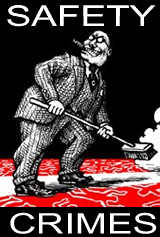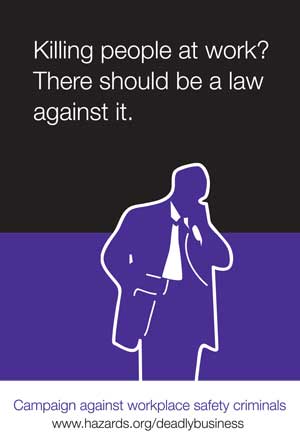OSHA: TB Standard? What TB Standard?
American Federation of State, County and Municipal Employees President Gerald W. McEntee today
petitioned Labor Secretary Elaine Chao to
immediately issue its long overdue tuberculosis (TB) standard to protect American workers against exposure to TB, a standard that will also protect workers against Severe Acute Respiratory Syndrome (SARS). AFSCME was among the unions to originally petition the agency for a TB standard almost 10 years ago.
OSHA originally
proposed a TB standard in 1997 and was close to issuing the standard when the Bush Administration came in and immediately shoved it to the back burner. OSHA even has a
Compliance Directive enabling the agency to enforce violations of best practices for TB control. The standard was strongly opposed by such organizations as the American Hospital Assocation.Thirteen people have died of SARS in Canada and there have been 193 suspected cases in the U.S., but no deaths.
In what might be considered an understatement, James August, director of occupational safety and health for AFSCME warned that
"There is great anxiety among health-care workers that it could happen here because of international travel. And there is no reason to think it couldn't, given what happened in Toronto."
AFSCME was one of several unions to originally petition OSHA for a TB standard in 1995.
What's most interesting about this saga is that OSHA just posted a
SARS Web Page. And although there are tons of references to OSHA's Bloodborne Pathogens Standard and references on its SARS webpage,
there's not a single reference to tuberculosis, despite the fact that OSHA has an extensive TB webpage
describing the same precautions that are needed to protect health care workers and others against SARS.
Is the agency embarassed that it had deepsixed the standard when it's clear now that it was needed?Actually, it's clear that a TB standard was already needed. Athough a serious outbreak several years ago was controlled, TB is still a serious problem in the United States. Drug resistant strains are especially deadly. And, as OSHA documents, in its Web Page, "TB is the leading cause of death due to an infectious agent in the world," which means it's a major problem among immigrants in the U.S.and anyone who is exposed to them.
AFSCME's petition referenced a National Academy of Sciences/Institute of Medicine (IOM) 2001 Report that "Overall, the committee concludes that tuberculosis remains a threat to some health care, correctional facility, and other workers in the United States. Although the risk has been decreasing in recent years, vigilance is still needed within hospitals, prison, and similar workplaces, as well as in the community at large." The IOM study also concluded that an OSHA standard was necessary to protect workers.
On the other hand, OSHA has designed an attractive SARS logo and the agency, which has basically gone out of the regulations business, has included its usual legal disclaimer on the SARS web page, assuring employers that while they can be cited under the General Duty Clause for not providing a safe workplace, the the information on its web site is not "itself is not a new standard or regulation, and it creates no new or independent legal obligations." Wouldn't actually want to cite employers for not protecting their employees.
According to a
Reuters article, "Officials at OSHA declined comment." Must be busy with homeland security, and voluntary guidelines and, uh, stuff.

